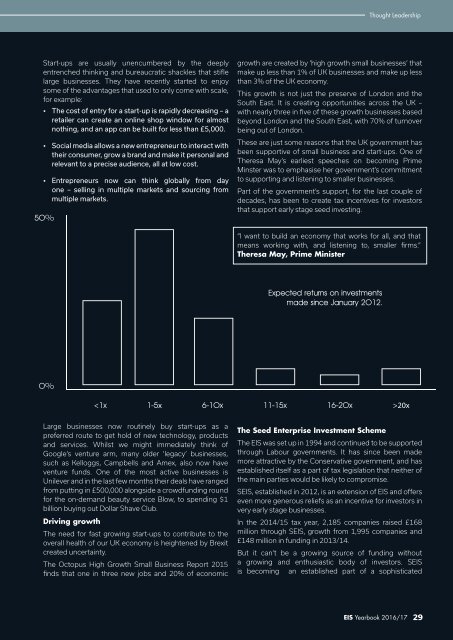2fnoNyY
2fnoNyY
2fnoNyY
You also want an ePaper? Increase the reach of your titles
YUMPU automatically turns print PDFs into web optimized ePapers that Google loves.
Thought Leadership<br />
Start-ups are usually unencumbered by the deeply<br />
entrenched thinking and bureaucratic shackles that stifle<br />
large businesses. They have recently started to enjoy<br />
some of the advantages that used to only come with scale,<br />
for example:<br />
• The cost of entry for a start-up is rapidly decreasing – a<br />
retailer can create an online shop window for almost<br />
nothing, and an app can be built for less than £5,000.<br />
• Social media allows a new entrepreneur to interact with<br />
their consumer, grow a brand and make it personal and<br />
relevant to a precise audience, all at low cost.<br />
• Entrepreneurs now can think globally from day<br />
one – selling in multiple markets and sourcing from<br />
multiple markets.<br />
50%<br />
growth are created by ‘high growth small businesses’ that<br />
make up less than 1% of UK businesses and make up less<br />
than 3% of the UK economy.<br />
This growth is not just the preserve of London and the<br />
South East. It is creating opportunities across the UK –<br />
with nearly three in five of these growth businesses based<br />
beyond London and the South East, with 70% of turnover<br />
being out of London.<br />
These are just some reasons that the UK government has<br />
been supportive of small business and start-ups. One of<br />
Theresa May’s earliest speeches on becoming Prime<br />
Minster was to emphasise her government’s commitment<br />
to supporting and listening to smaller businesses.<br />
Part of the government’s support, for the last couple of<br />
decades, has been to create tax incentives for investors<br />
that support early stage seed investing.<br />
“I want to build an economy that works for all, and that<br />
means working with, and listening to, smaller firms.”<br />
Theresa May, Prime Minister<br />
Expected returns on investments<br />
made since January 2012.<br />
0%<br />
20x<br />
Large businesses now routinely buy start-ups as a<br />
preferred route to get hold of new technology, products<br />
and services. Whilst we might immediately think of<br />
Google’s venture arm, many older ‘legacy’ businesses,<br />
such as Kelloggs, Campbells and Amex, also now have<br />
venture funds. One of the most active businesses is<br />
Unilever and in the last few months their deals have ranged<br />
from putting in £500,000 alongside a crowdfunding round<br />
for the on-demand beauty service Blow, to spending $1<br />
billion buying out Dollar Shave Club.<br />
Driving growth<br />
The need for fast growing start-ups to contribute to the<br />
overall health of our UK economy is heightened by Brexit<br />
created uncertainty.<br />
The Octopus High Growth Small Business Report 2015<br />
finds that one in three new jobs and 20% of economic<br />
The Seed Enterprise Investment Scheme<br />
The EIS was set up in 1994 and continued to be supported<br />
through Labour governments. It has since been made<br />
more attractive by the Conservative government, and has<br />
established itself as a part of tax legislation that neither of<br />
the main parties would be likely to compromise.<br />
SEIS, established in 2012, is an extension of EIS and offers<br />
even more generous reliefs as an incentive for investors in<br />
very early stage businesses.<br />
In the 2014/15 tax year, 2,185 companies raised £168<br />
million through SEIS, growth from 1,995 companies and<br />
£148 million in funding in 2013/14.<br />
But it can’t be a growing source of funding without<br />
a growing and enthusiastic body of investors. SEIS<br />
is becoming an established part of a sophisticated<br />
EIS Yearbook 2016/17<br />
29


